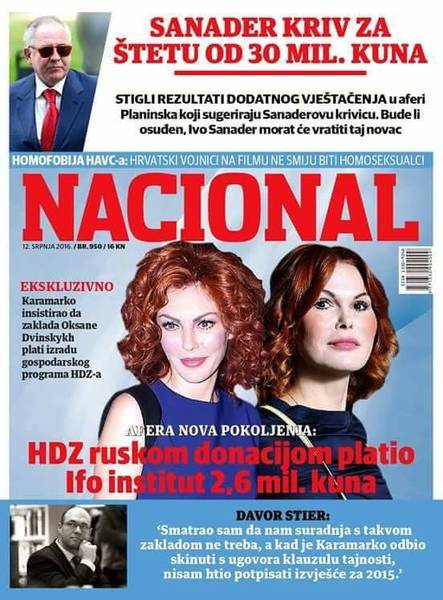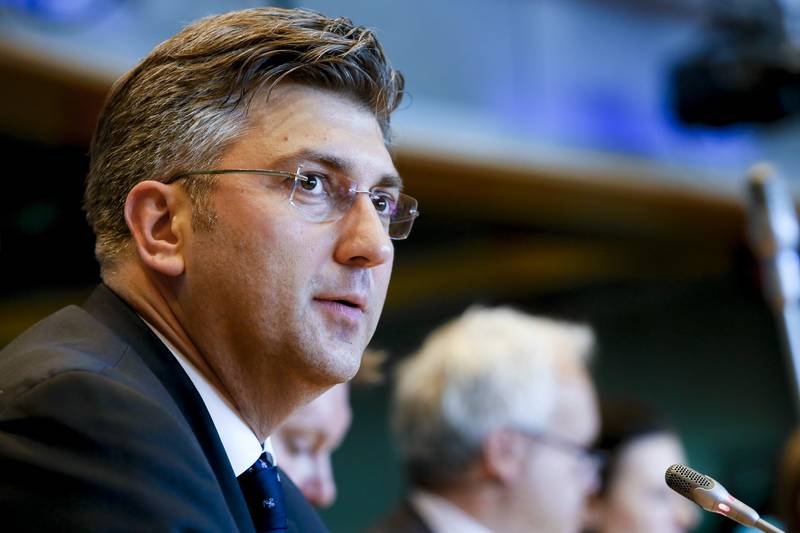Russian Money Creeping into Croatia*
Adelina Marini, July 14, 2016
 Scandals in one of the two leading political parties in Croatia – the Christian Democratic Union (HDZ) – seem to have no end and the road to catharsis will turn out to be way thornier than it was expected just a month ago. The party, considered fundamental to Croatian statesmanship because it is in the foundation of Croatia winning its independence from former Yugoslavia, is passing through a second wave of failure in the eyes of Croatian citizens. The first wave was when the party was shaken by a row of corruption scandals, which led to the sentence for corruption of the first prime minister in the region – Ivo Sanader, who was also a leader of the HDZ. Moreover, the party itself was also sentenced for corruption at the first instance, which led to blocking the party’s bank accounts and hindered its financing for several elections, held in the last four years. The scandals in Sanader’s HDZ also brought a loss in the parliamentary elections in 2011.
Scandals in one of the two leading political parties in Croatia – the Christian Democratic Union (HDZ) – seem to have no end and the road to catharsis will turn out to be way thornier than it was expected just a month ago. The party, considered fundamental to Croatian statesmanship because it is in the foundation of Croatia winning its independence from former Yugoslavia, is passing through a second wave of failure in the eyes of Croatian citizens. The first wave was when the party was shaken by a row of corruption scandals, which led to the sentence for corruption of the first prime minister in the region – Ivo Sanader, who was also a leader of the HDZ. Moreover, the party itself was also sentenced for corruption at the first instance, which led to blocking the party’s bank accounts and hindered its financing for several elections, held in the last four years. The scandals in Sanader’s HDZ also brought a loss in the parliamentary elections in 2011.
Alas, his successor on the post – Tomislav Karamarko – a dark figure, linked to the Croatian security services – made an impression of cleaning out of the party from its corrupt past, but in the meantime managed to turn to the far right as well. After four hard years of convincing voters that the party has “turned a clean page”, the first six months of 2016 revealed not only that the catharsis has failed to happen, but even made Ivo Sanader look like a petty thief. Scandals started from day one of the rule of the coalition government, headed by Canadian migrant Tihomir Orešković, in which the HDZ is a senior partner. Their scope was wide and difficult to digest – from attempts at revision of the country’s Ustaša past, through low integrity in appointments to government posts, to the mega scandal surrounding the Croatian petrol company Ina, when it was proved that Mr Karamarko was in a heavy conflict of interests because of his wife Ana Karamarko’s PR company.
At the end of June the government fell and the HDZ started cleaning up after itself to finally begin in the clear with a heavy battle with time, for the snap elections are in September and there is still hope in the party that they will manage to at least reach the level result of the previous parliamentary elections of November 2015. It is expected that the leader’s post will be taken by the influential MEP Andrej Plenković, whose past is clean. He is regarded a moderate conservative with a wide European perspective. Expectations of him are high that under his leadership and, owing to the people who he has surrounded himself with, the party will finally cut itself loose of its dark past and will turn into the reformist power that Croatia desperately needs. His task is difficult, for he will have to work with many of the people who are rather part of the problem than a part of the solution.
Andrej Plenković, the expected new leader of HDZ
However, during his tour of the country to present his programme, the latest scandal caught up with him, this time of geopolitical magnitude. Croatia’s Nacional magazine, which has turned over the last few months in a post box for HDZ scandals, revealed that one of the HDZ donors is an endowment that has Russian capital of unclear origin behind it. The face of the endowment and of several other companies, whose names appeared in a sequence of scandals over the last few months, is Oksana Dvynskikh. She is a Croatian national of Ukrainian descent. She is a close friend to the Karamarko family. Her name surfaced around an attempt by one of her companies to participate in an energy project, connected with nuclear energy in Finland.
Finnish authorities, however, discarded the company due to doubts that there is Russian money behind it. Finland read this as an attempt to circumvent EU sanctions against Russia. It is curious that Oksana Dvynskikh and the Karamarko family appeared at the same time last year in Finland, at the exact time when the company made the attempt to plug into the Finnish energy project. According to Nacional data, the “New generation” foundation donated 2.6 million kuna (approximately 350 000 euro) to the HDZ. This was done with no transparency and without having the presidency of the party informed. According to Croatian media, the scandal is huge for there is the possibility that this is a money-laundering scheme through the party. HDZ is a member of the European People’s Party. Tomislav Karamarko does not see anything wrong. All was done by the law, say people close to him. He himself has not yet appeared publicly to comment in person. Over the last few months, however, it is not legality, but integrity of actions that is questioned.
 The future leader of the party Andrej Plenković has so far been cautious, but adamantly states that considering the HDZ’s Euro-Atlantic orientation, financing from such origins is unacceptable. His right-hand man Davor Ivo Stier (also a MEP) – stated that the main goal of the HDZ is to break the back of clientelism, which has been plaguing the party for years and has been polluting Croatia’s political scene. Croats’ attitude towards the Russians is not such a sensitive subject as it is in Bulgaria and the Baltic states for example. Ordinary supporters of HDZ and not only this party, whom I have spoken to, see nothing wrong in keeping trade relations with Russia because the country has not suffered Russian occupation, but has lived sheltered in former Yugoslavia, which created the Movement of Non-Aligned Countries during the Cold war. At the same time, however, Ukraine for example views Croatia as its close ally because Croats show great understanding towards Ukrainians in the case of the Crimea, for they have had similar experiences during their war for separation from former Yugoslavia.
The future leader of the party Andrej Plenković has so far been cautious, but adamantly states that considering the HDZ’s Euro-Atlantic orientation, financing from such origins is unacceptable. His right-hand man Davor Ivo Stier (also a MEP) – stated that the main goal of the HDZ is to break the back of clientelism, which has been plaguing the party for years and has been polluting Croatia’s political scene. Croats’ attitude towards the Russians is not such a sensitive subject as it is in Bulgaria and the Baltic states for example. Ordinary supporters of HDZ and not only this party, whom I have spoken to, see nothing wrong in keeping trade relations with Russia because the country has not suffered Russian occupation, but has lived sheltered in former Yugoslavia, which created the Movement of Non-Aligned Countries during the Cold war. At the same time, however, Ukraine for example views Croatia as its close ally because Croats show great understanding towards Ukrainians in the case of the Crimea, for they have had similar experiences during their war for separation from former Yugoslavia.
Now, after the breaking of this consecutive scandal, there is a different view on the statement of Serbian PM Aleksandar Vučić from last year, that he is glad of the fact that HDZ are coming to power, expecting better cooperation. Vučić’s party and the HDZ are in the right-wing political spectrum, but considering the discovery of Nacional the question arises whether it is possible that the two parties are linked by Russia? This is a very important question, because Serbia is torn by geopolitical pressure and one day will have to make a choice – with Russia, or with the EU.
This choice could, however, be dismissed if it turns out that more EU member states are keeping good relations with Russia and rely on these relations for their party, personal, or economic survival. This will be catastrophic to the Union, in which there are already a considerable number of parties with real chances to power who sympathise with Russia, but not all of them are proved to be financed by the Kremlin. This is known for certain about the Front National of Marine Le Pen. In this sense, the scandal in the HDZ goes beyond the borders of Croatia and could have geopolitical effect. The task, faced by Andrej Plenković, becomes even more difficult, for if he fails to clean the party of its clientelism and low integrity, Croatia could turn into another European weak link, where Russia would be able to work untroubled on the erosion of the European project.
Translated by Stanimir Stoev
*This text first appeared in Bulgarian in the Terminal 3 news website
 Kolinda Grabar-Kitarovic | © KGK
Kolinda Grabar-Kitarovic | © KGK Jozo Rados | © European Parliament
Jozo Rados | © European Parliament Aleksandar Vucic, Andrej Plenkovic | © Vlada RH
Aleksandar Vucic, Andrej Plenkovic | © Vlada RH